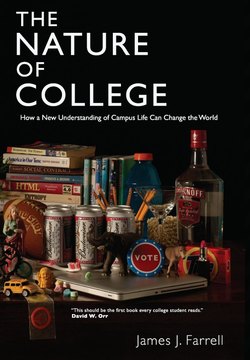Читать книгу The Nature of College - James J. Farrell - Страница 16
На сайте Литреса книга снята с продажи.
Alarming: The Cultural Work of Clocks
ОглавлениеIt can be alarming to think deeply about an alarm clock. Normally college students notice it just twice a day, setting it at night and hearing it, regretfully, in the morning. But the time it tells transforms the whole day, and the world.
Most Americans are obsessed with time, as our language suggests: We’re saving time or spending it, marking time or killing it. We have free time on the weekends—which seems to suggest that we have slave time most of the week. Many of us even feel like we’re doing time, caught in a prison of work and obligations. Whatever we call it, however, all of our times are structured by clock time, the social construction of weeks and days and hours and minutes that shape our appointment books and our lives. Like many of our technical marvels, clocks and watches are machines that do the work of social construction, converting nature into culture, and in this case, nature’s time into human time.3
Historically, human beings adjusted their life cycles to the rhythms of day and night, and slept until they were rested or until they were disturbed—often by the call of nature. It’s a natural fact that human beings need sleep, and that animals, including humans, have circadian rhythms—cycles of brain-wave activity, core body temperature swings, hormone production, and cell regeneration schedules—that attune the body to the rotations of the planet. In the modern world, however, the body’s circadian rhythms proved too imprecise for the demands of capitalism: People who followed natural rhythms might be late for the factory work of the industrial revolution. So the body had to be broken to the discipline of mechanical time.4
As early as the 1830s, Alexis de Tocqueville observed that Americans were obsessed with time, always busy with the consuming passions of individualism: “The inhabitant of the United States,” he observed, “attaches himself to the goods of this world as if he were assured of not dying, and he rushes so precipitately to grasp those that pass within his reach that one would say he fears at each instant he will cease to live before he has enjoyed them. He grasps them all but without clutching them, and he soon allows them to escape from his hands so as to run after new enjoyments.” This culture, in which “rush hour” might be any hour of the day, has survived and thrived in America, leading to a society plagued by what sociologists call “time poverty.” In a culture of time poverty, we don’t have enough time for what really matters to us, because we’re too busy doing other things. Even at college, which is designed to be an interval of slow time in life, many students don’t make time for meaningful work or for reflection about their hopes and dreams because there’s “too much to do.” Our “lack” of time has environmental impacts because it drives us to convenience, where we often accept resource-intensive solutions to our time-management problems. We believe in fast food, for example, because we lead fast lives, circumscribed by the seconds of the clock.5
An alarm clock tells us to get up and get to work “on time,” but in focusing our attention on today’s time it marginalizes other important times of our lives, like yesterday or tomorrow. Yesterday, the clock presumes, is just history, and tomorrow might as well be science fiction. Clock time is also just human time. It helps us get places on time, but it keeps us from considering natural time and—depending on our beliefs—supernatural time. By focusing our attention on the personal present, it keeps us from other temporal perspectives, perhaps until it’s literally too late.
